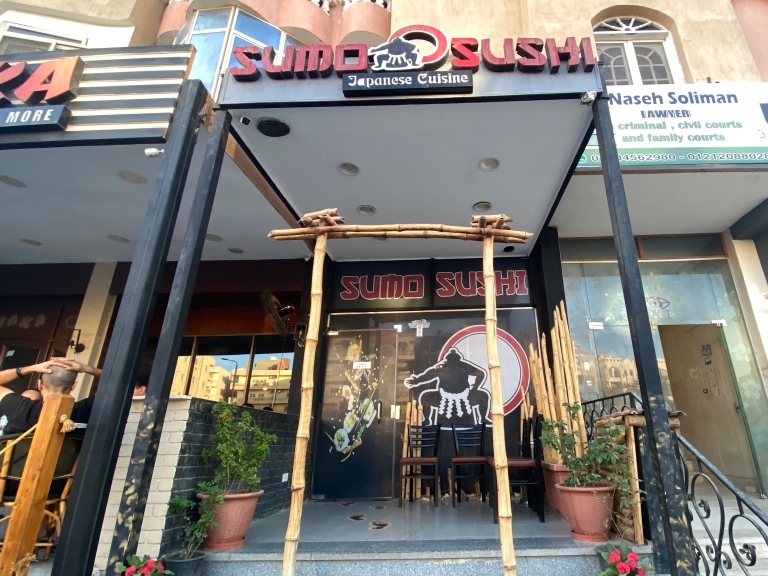
Interesting decor, enticing food names, and endearing staff made this a meal Ikuna will always remember!
Our Japanese-language reporter Ikuna Kamezawa is busy living her best life traveling the world right now. After touring ramen restaurants in Spain and exploring plastic model hobby shops in Paris, she now finds herself checking out what the North African country of Egypt has to offer.
After many weeks of traveling, you’d think Ikuna was a little homesick for Japan, wouldn’t you? Normally, she would say she isn’t, except November is when the last Sumo tournament of the year is held, and Ikuna, a fan of sumo, isn’t here to see it, which makes her feel a little more inclined to miss her home country. Luckily for times like these, the best remedy is eating Japanese food–and where better to alleviate the loss of sumo than by eating at a place called Sumo Sushi?
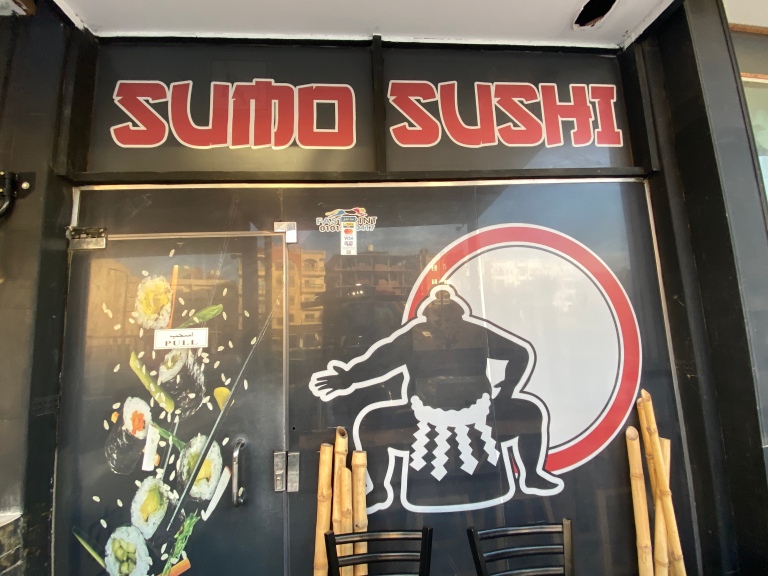
Ikuna found Sumo Sushi in a city about 500 kilometers (about 311 miles) south of Cairo known as Hurghada. As a beach resort town, it’s a popular vacation spot for European tourists, but not so much for Japanese travelers. Wondering what kind of sushi they might serve–and also harboring a vague hope that the owner might be a big sumo fan–she decided to make a stop for lunch there.
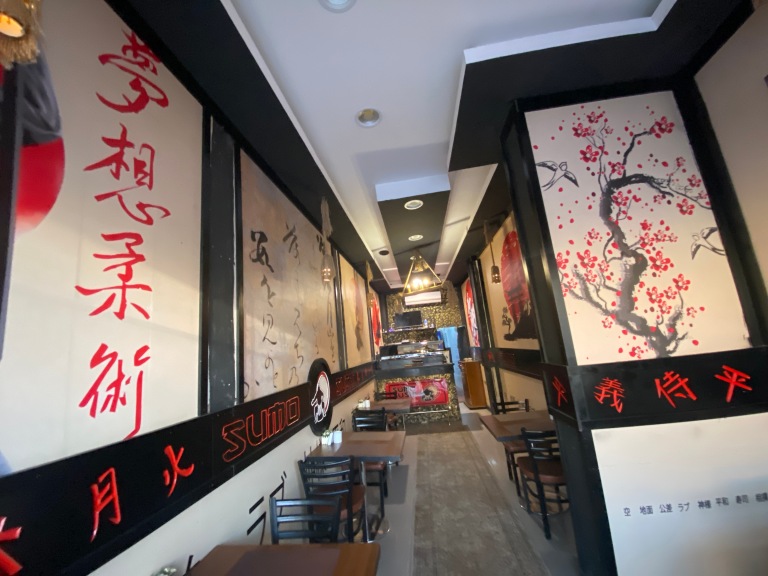
The inside was very compact, but neat and very nicely decorated.
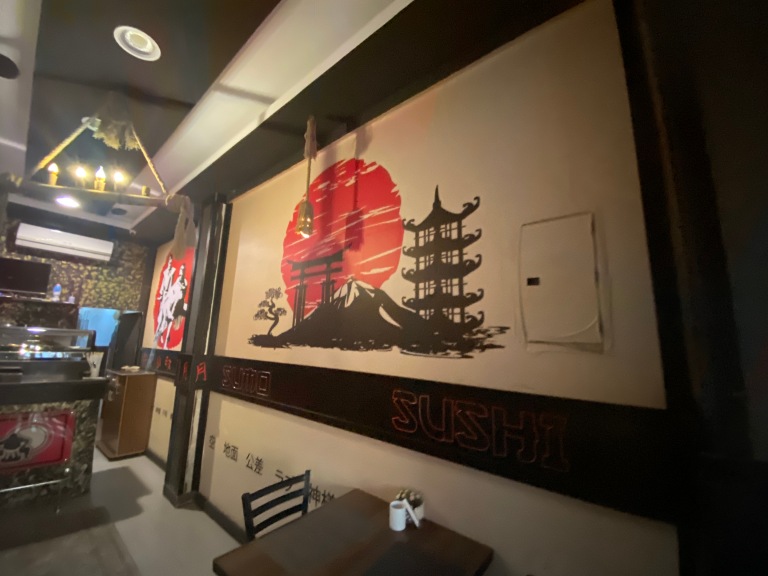
However, Ikuna found some of the use of kanji questionable…
▼ “Dream jiujitsu”?
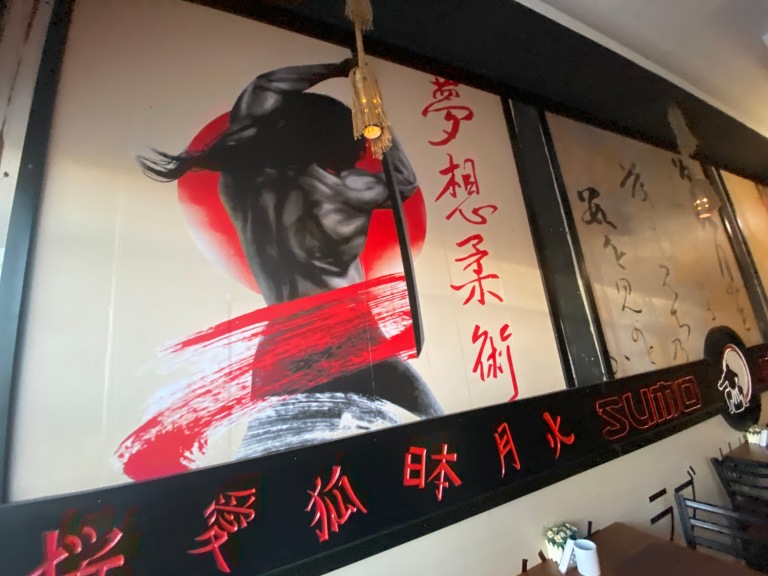
There were some Japanese words and characters printed around in random places on the walls. They weren’t nonsense words, but at the same time, Ikuna had to wonder about why they were placed in those particular spots and in that particular order.
▼ “Sky, Ground, Common Difference, Love, God, Peace, Sushi, Sumo, Sea”
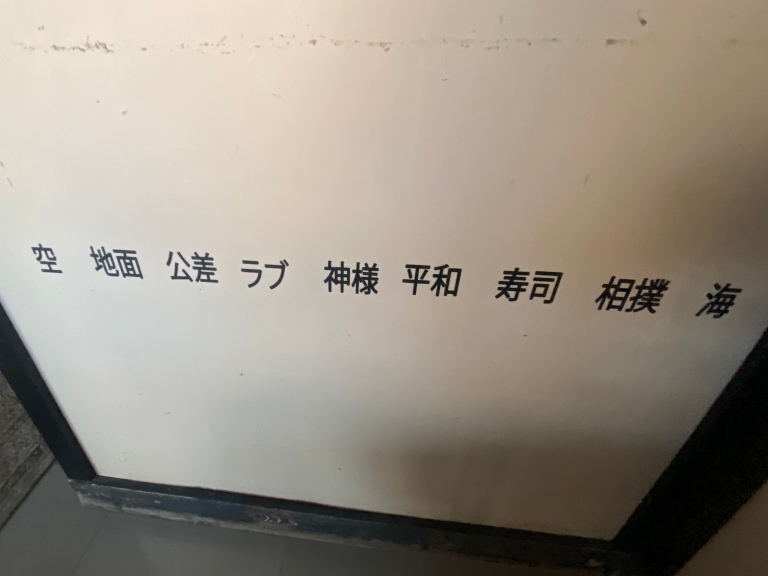
It seemed almost like some kind of secret code…Ikuna began to ponder if they had some sort of deep meaning she wouldn’t understand.
▼ “Cherry Blossom, Love, Fox”
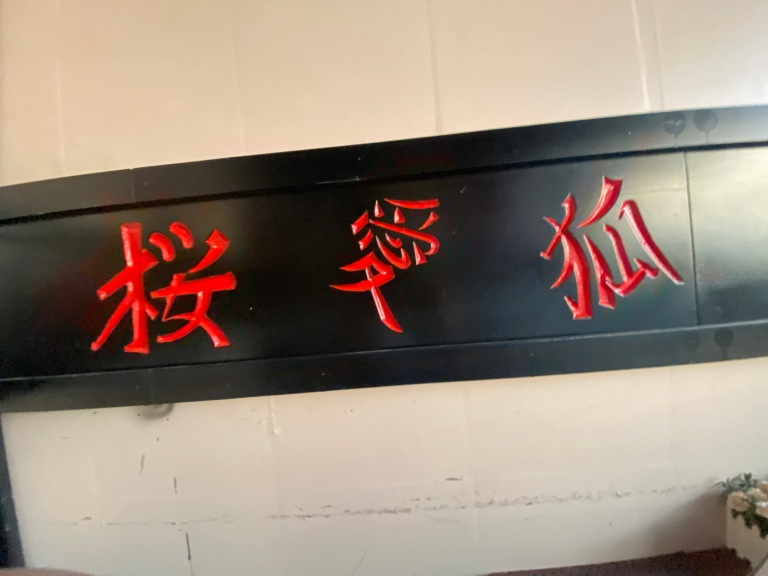
▼ “Justice, Samurai, Even”
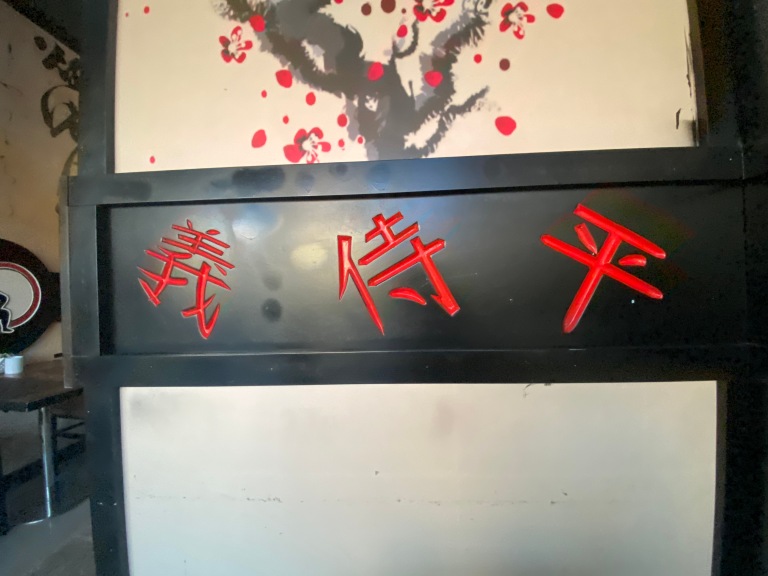
But though the decorative elements had a nice Japanese flair to them, the atmosphere was unlike any Japanese sushi restaurant Ikuna had ever been to.
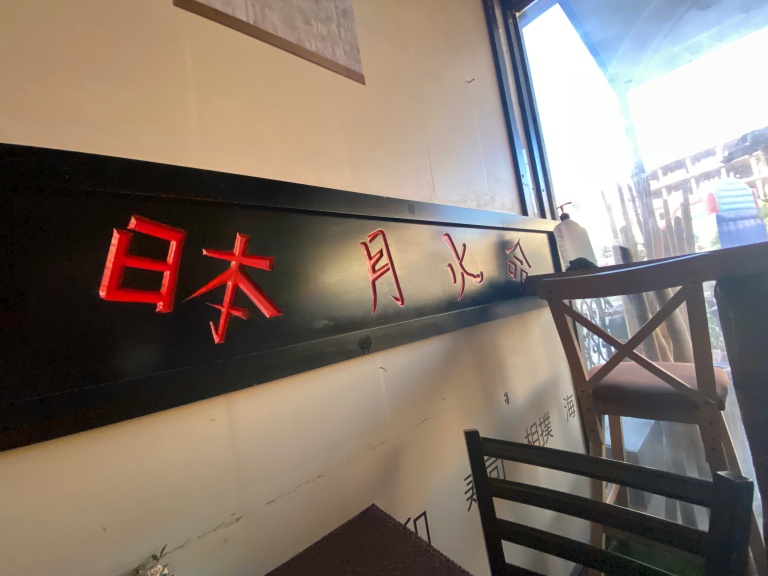
In any case, it did look like they put a lot of effort–and possibly money–into the decor.
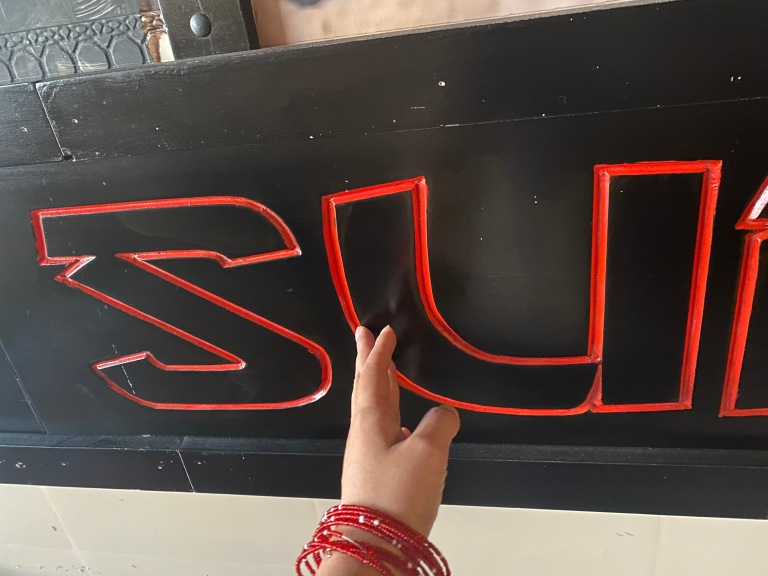
Ikuna was eager to try out the food. The menu had a variety of options besides sushi, including sashimi, fried rice, yakisoba, fried food, ginger pork, grilled fish, and katsudon.
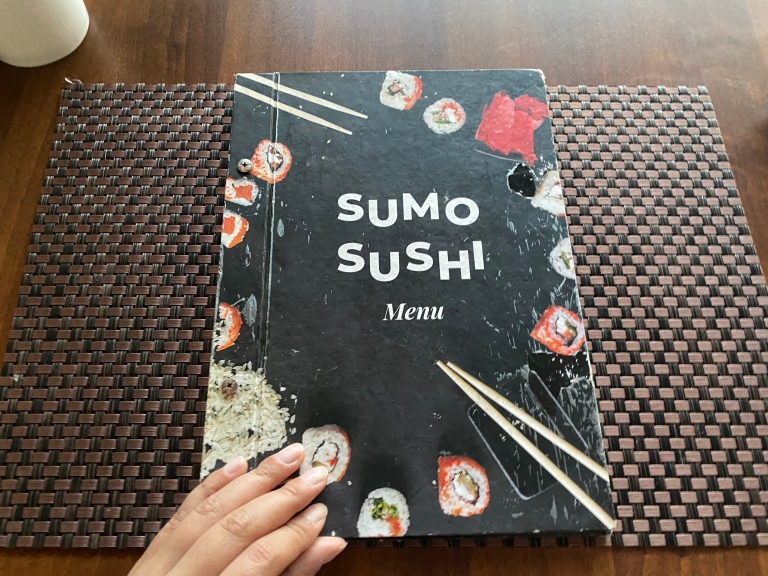
Naturally, Ikuna had to order miso soup, a must-have in a Japanese meal.
▼ The miso was priced at 45 Egyptian pounds, which works out to be 326 yen (US$2.84).
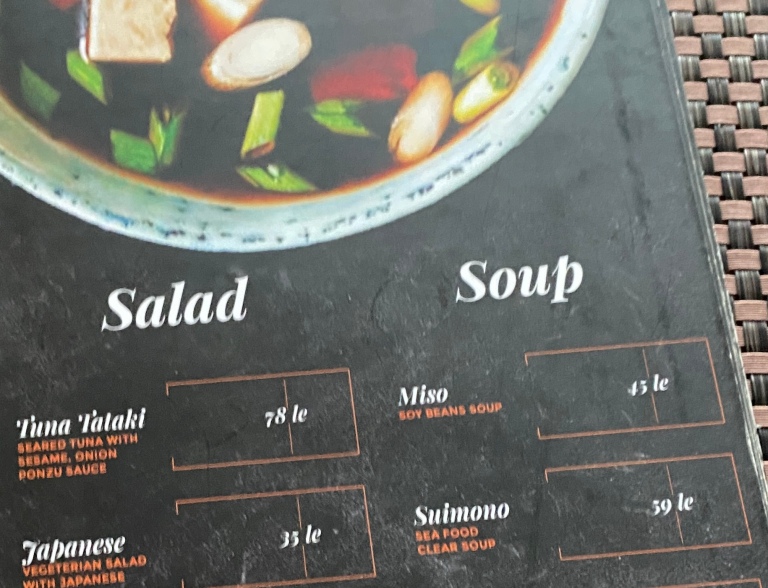
She also ordered five kinds of nigiri sushi (86 EGP [623 yen]).
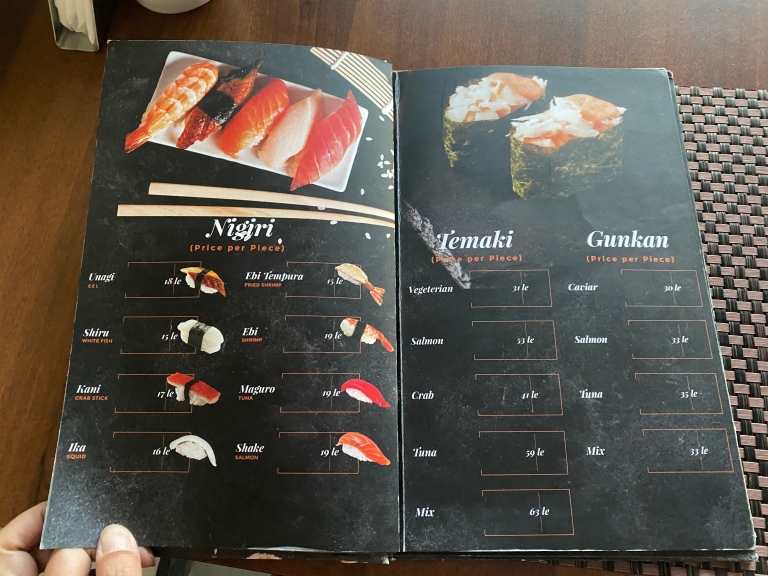
A slight misspelling of “tempura moriawase”–a selection of tempura vegetables and fish called “Tempura Moriwase” in this case–made Ikuna giggle, so she had to order that too for 79 EGP, or 573 yen.
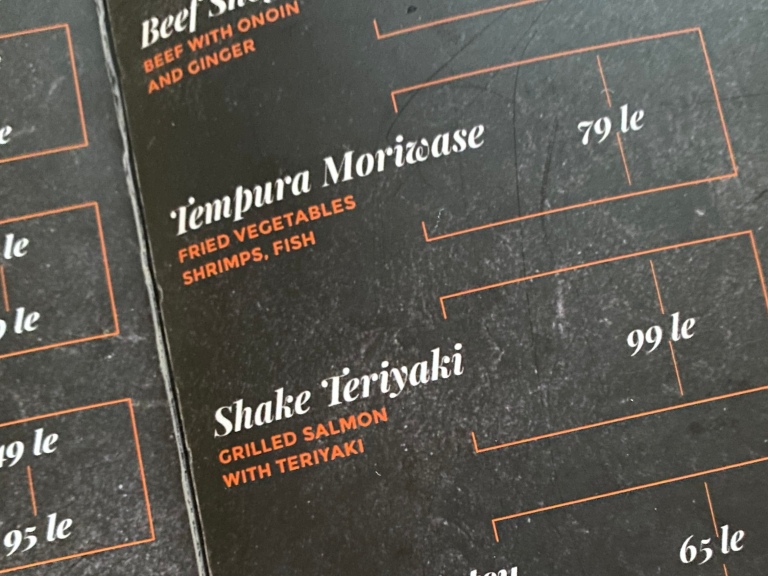
The names of the menu items all entertained Ikuna, and she couldn’t help but order her favorites. She ordered the “Ninja” (80 EGP for four pieces), which was a maki roll with crab, creamy cheese, and salmon.
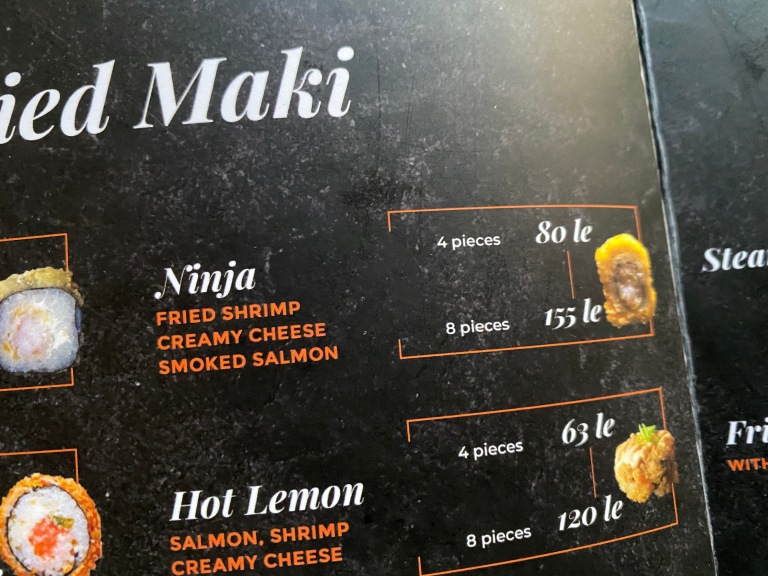
Lastly, she could not help but order the “Sumo” (87 EGP). Ikuna didn’t really know what it was, but she had to give it a try in the spirit of Sumo season!
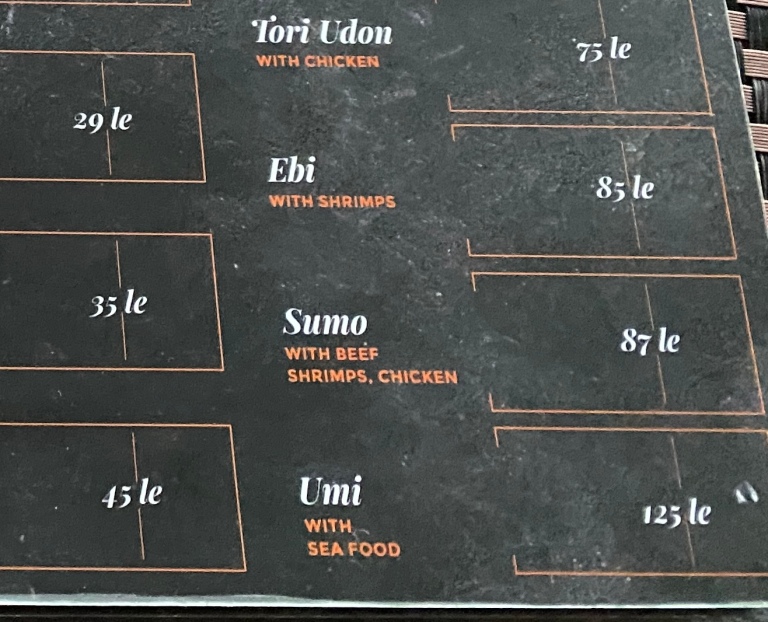
Once she placed her order, it didn’t take long for the staff to drop off a bottle of Kikkoman soy sauce. Oh!! Ikuna was very excited about this. She’d never seen Kikkoman in Egypt before.
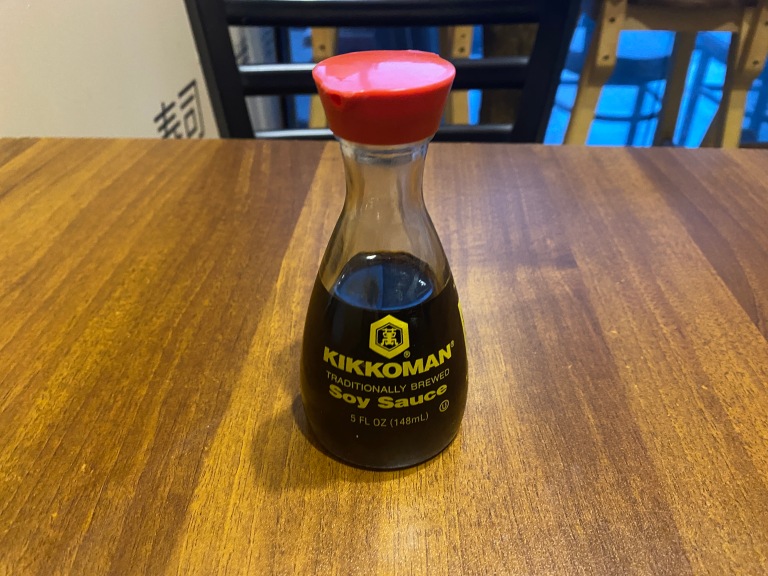
But it turned out that she had plenty of time to admire this Japanese brand of soy sauce because it wasn’t for another 40 minutes that her food began to arrive.
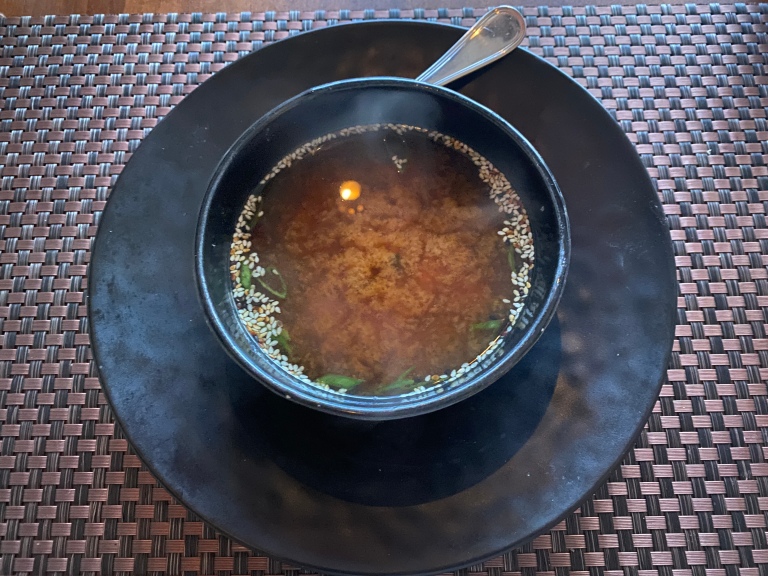
First came the miso soup, which took so long to arrive that Ikuna wondered if they had to ferment the beans first. Still, this soup was unexpectedly delicious.
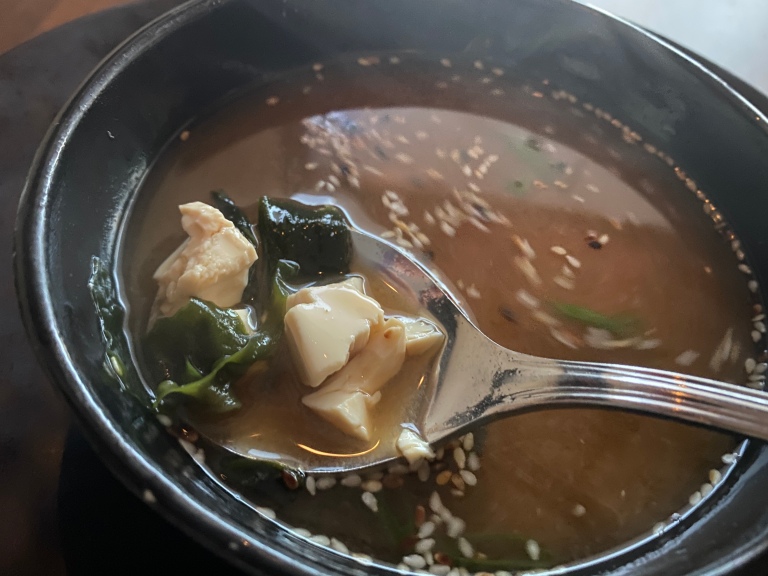
It had all the proper fixings of a miso soup, including tofu, green onions, wakame seaweed, and lots of sesame seeds. It also had a lovely fish-based broth that Ikuna really enjoyed. It was a satisfying intermezzo…
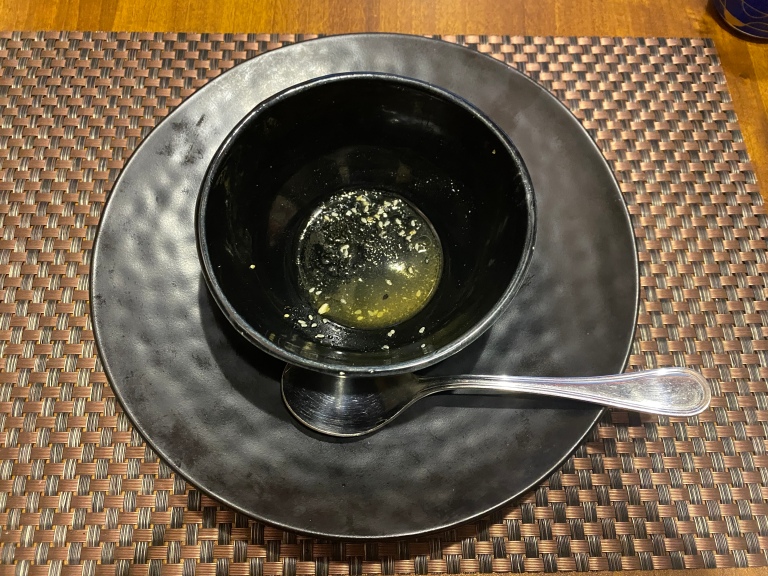
…that lasted about 30 minutes. Eventually, Ikuna hailed a server and asked if there was some kind of delay, but it seemed like their intention was to bring one dish at a time and give her plenty of time to enjoy each one. After she assured him that she was sitting on no such formalities and that she’d like them to bring everything at once, the server winked, said “Okay!” and ran off.
He soon returned with the “Tempura Moriwase”. On the right side was a pile of seafood, and on the left, vegetables, though they were all bell pepper slices. The plate came with a sweet chili sauce instead of ten-tsuyu, the typical broth that comes with tempura.
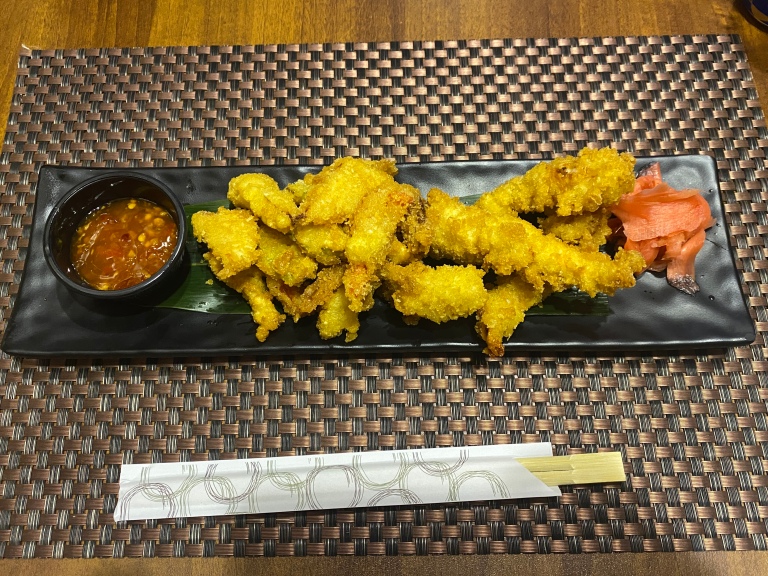
That was just as well because these weren’t typical tempura but more like crispy fried veggies and fish, so the sauce matched perfectly with the fried options.
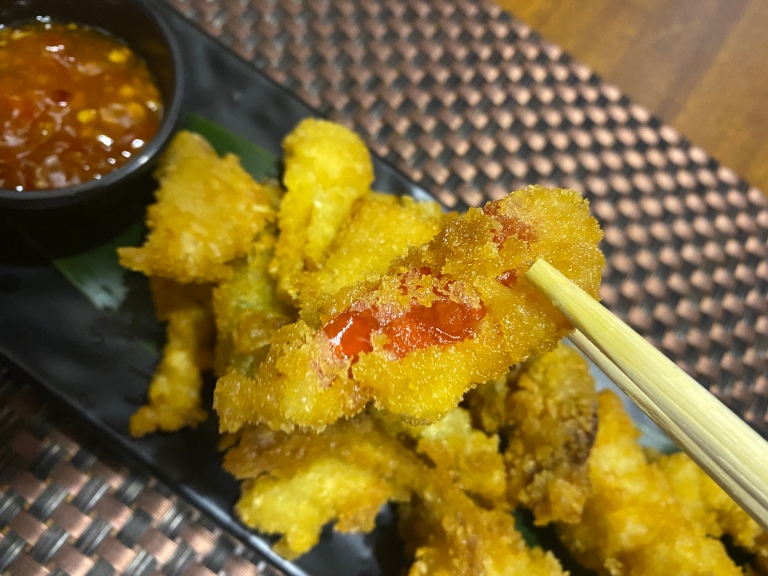
Though this style felt a bit more Vietnamese than Japanese, Ikuna had to admit that the quality of these fried delicacies was really high. The batter was neither too thin nor too thick, and it came out nice and hot and crispy. It was really delicious!
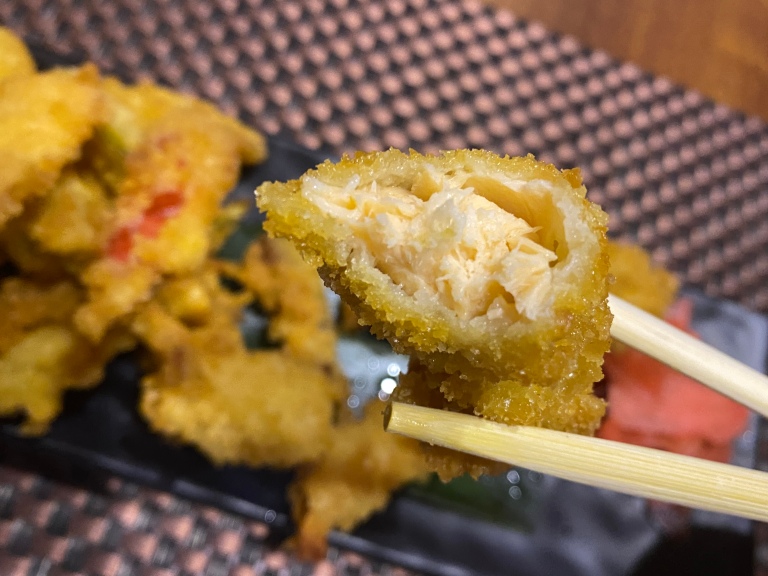
Soon the sushi arrived. Ikuna had ordered shrimp, white fish, salmon, eel, and fried shrimp.
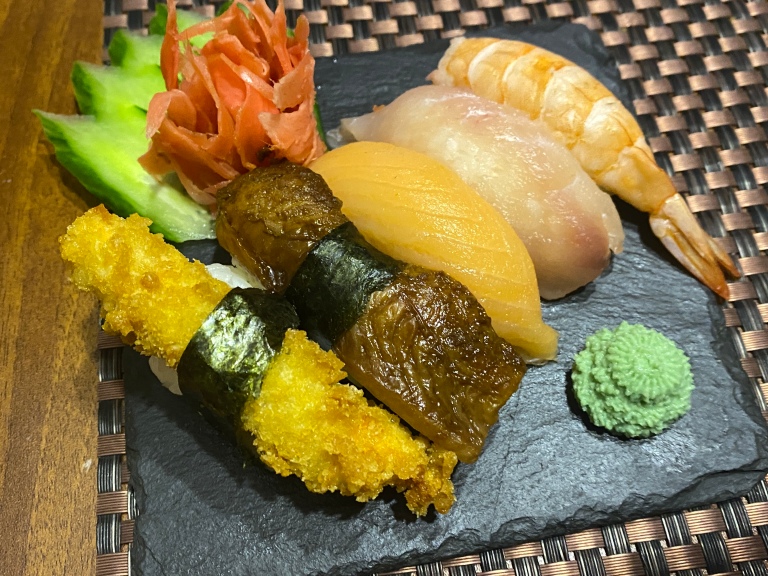
She was really happy that she was also supplied with a good amount of wasabi and pickled ginger.
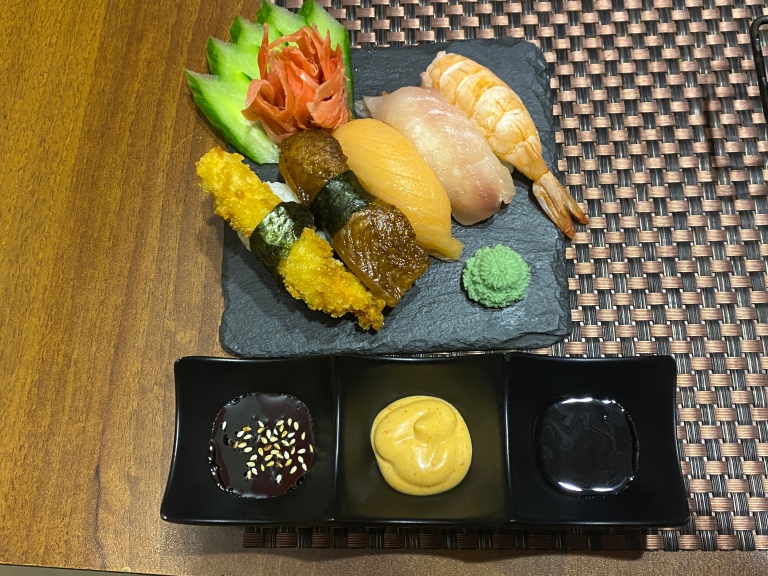
They did also serve it with some kind of mystery sauce and mayonnaise, but Ikuna is a simple Japanese woman, so she dressed her sushi only with soy sauce.
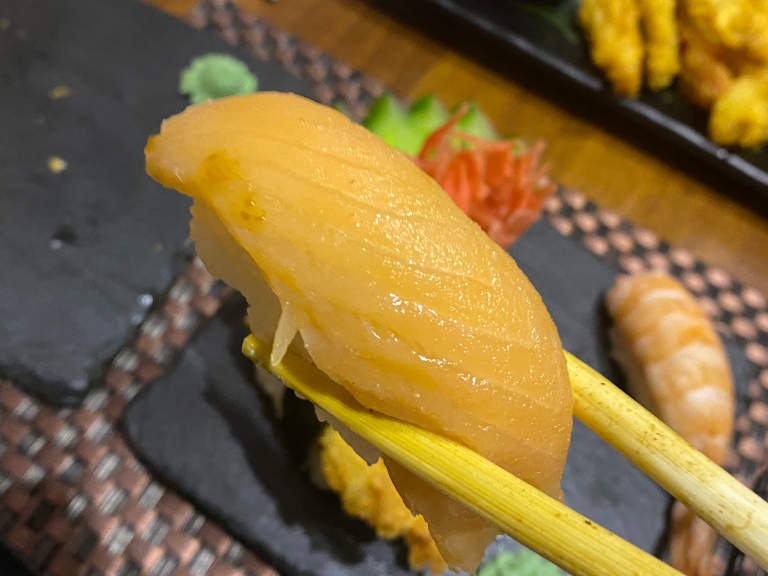
The quality of the sushi was pretty decent; about as good as sushi she’d eaten in Europe. Of course, it didn’t really hold a candle to Japanese sushi, but given that it’s much harder to find Japanese ingredients in Egypt, she thought the sushi at Sumo Sushi was pretty good.
The rice didn’t have that distinctive vinegar taste she liked in sushi, but she could tell it was well-made rice. She also liked that the flavor of the unagi particularly came through.

Next to arrive was the Ninja!
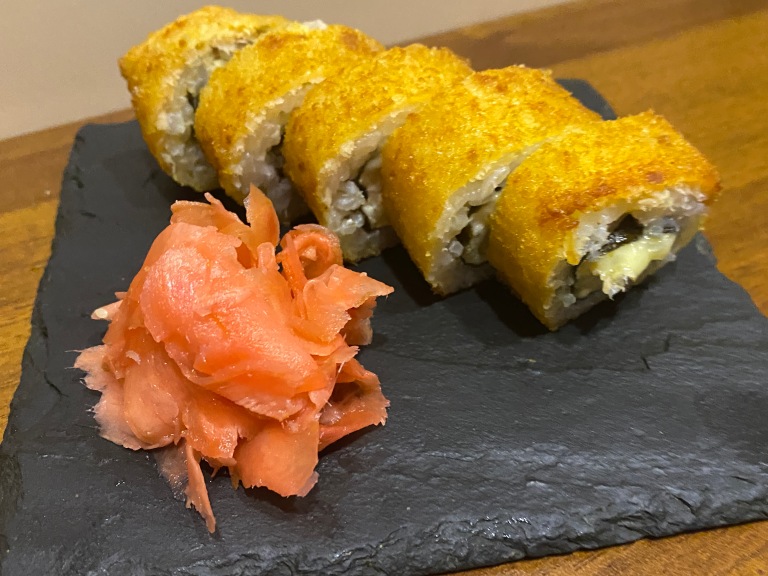
It turned out to be a deep-fried maki roll. Ikuna somewhat regretted this choice as she’d already eaten a lot of fried food, but she couldn’t resist how good it looked.
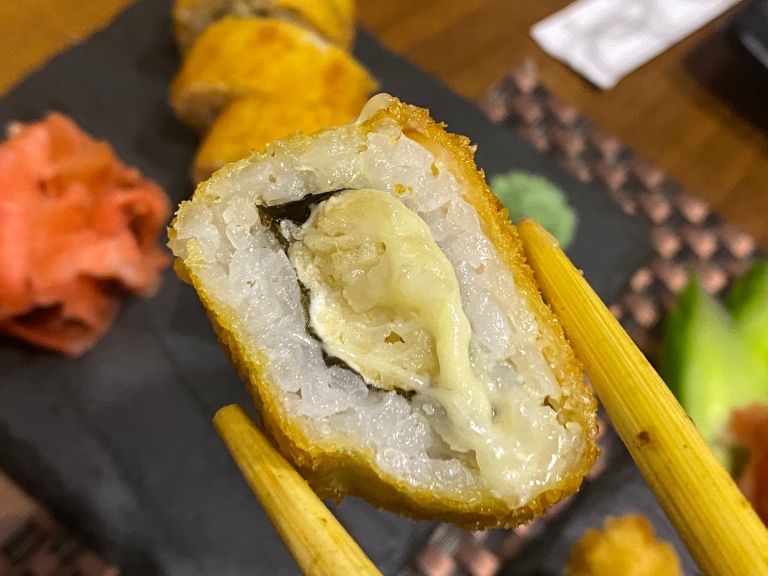
This roll consisted of soft, melted cheese, wrapped in seaweed, wrapped in rice, then wrapped in a batter and deep-fried. “Cheesy” was the dominant flavor of this roll. Was this dish cheese masquerading as sushi, or fried food masquerading as sushi? And does the “Ninja” name come from its use of disguise? Ikuna did not know, but she wasn’t going to complain too much.
Finally, the last dish Ikuna ordered arrived: the mysterious “Sumo”.
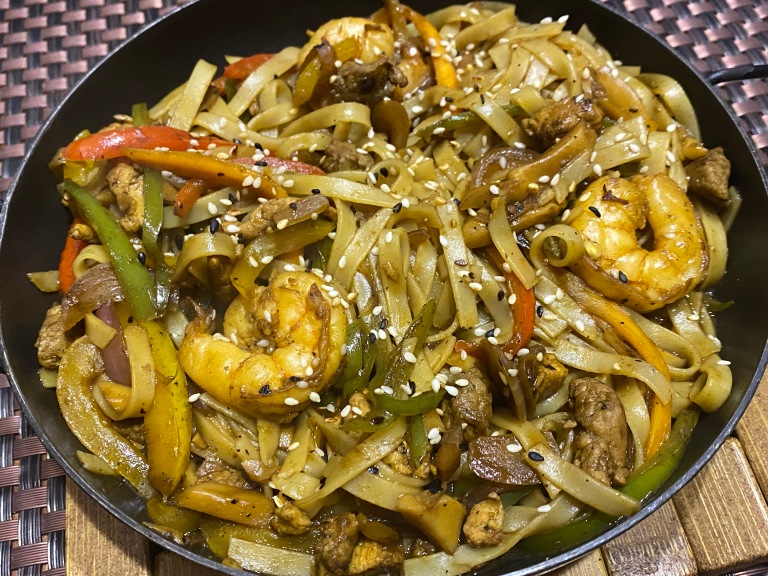
It was something like yaki-udon–stir-fried noodles!
Right away it was clear where the name “Sumo” came from. The round cast-iron bowl it came in was clearly representative of a sumo ring. The three shrimp represented the sumo wrestlers and the referee, and perhaps the bell pepper slices were meant to symbolize the tassels of their loincloths. The sesame seeds were, of course, the grains of salt scattered around the ring.
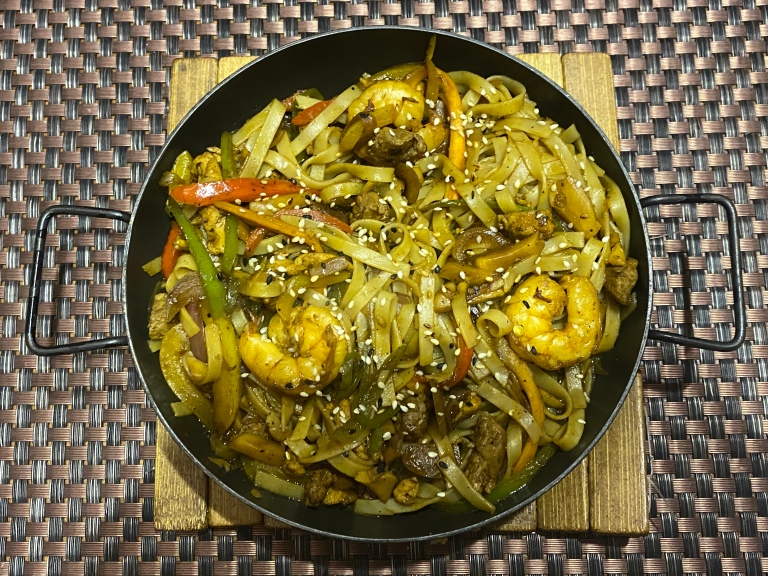
Ikuna honestly couldn’t think of a better dish to be called “Sumo”. And when she took a bite…she realized it was delicious! It didn’t taste Japanese at all, but it reminded Ikuna faintly of food she’d eaten at a Thai street stall. Pieces of chicken and beef awaited at the bottom of the bowl, giving new meaning to the sumo phrase, “Rank and honor are buried in the ring.”
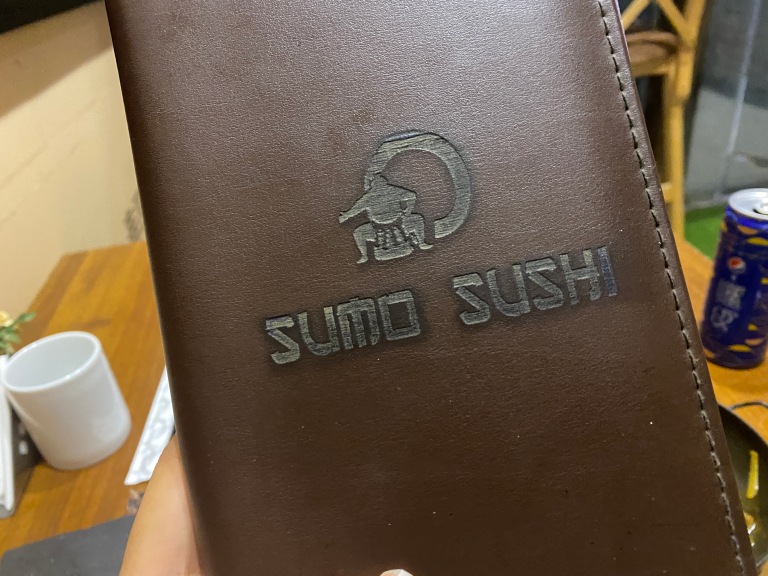
Though she went by herself, Ikuna managed to rack up a bill of 420 Egyptian pounds, which is about 3,000 yen or US$27, and that’s without any alcohol, which the restaurant did not serve. Based on the bill, Ikuna supposed that sushi must be a luxury meal in Egypt, but considering how much food she ordered, it’s not really surprising that she had such a high bill.

But Ikuna didn’t mind the cost. As she’d eaten, the waitstaff, knowing she was Japanese, frequently came by to ask her what she thought of the food. Afternoon turned to dusk as the restaurant slowly began to fill up with what Ikuna assumed was wealthy locals. As she ate her unusual meal, eagerly attended to by the staff and surrounded by other content diners, Ikuna had to wonder if there was any sushi restaurant in Egypt more beloved than this one, and she couldn’t help but feel deeply touched.
“Sumo sushi, I’ll be back again one day!”
Images © SoraNews24
● Want to hear about SoraNews24’s latest articles as soon as they’re published? Follow us on Facebook and Twitter!
